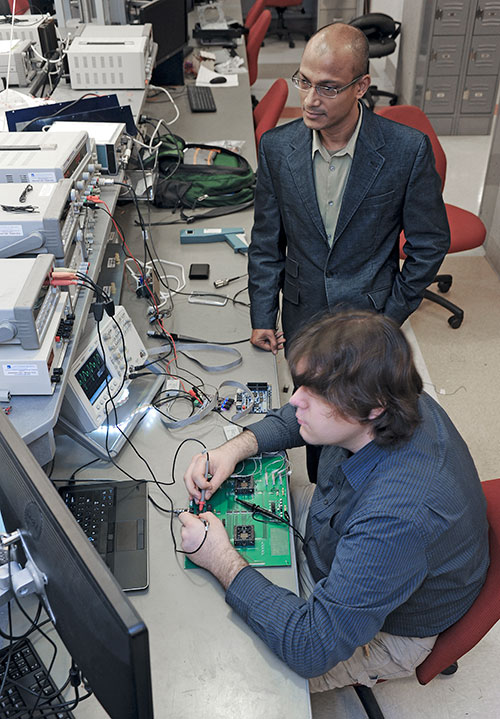launch
ATTACKING CYBERSECURITY VULNERABILITIES
 photo: Roadell Hickman
Swarup Bhunia (standing) and Andrew Hennessy
photo: Roadell Hickman
Swarup Bhunia (standing) and Andrew Hennessy
Swarup Bhunia's students at Case Western Reserve are going to war. Their targets: each other. Their mission: the total collapse of enemy infrastructure. Their objective: protecting any computer system from any attack.
Bhunia, PhD, with collaborators at Cleveland State University (CSU), is behind the war games. It's part of the cybersecurity curricula the team is developing with the help of a $200,000 grant from the National Science Foundation.
The comprehensive Case Western Reserve program is one of the first for undergraduates in the country, said Bhunia, the T. and A. Schroeder Associate Professor of electrical engineering and computer science. It grew out of his realization that few undergraduates had cybersecurity experience. "These are students who will become the future developers and controllers of computer systems—including the national infrastructure," Bhunia said. "They have to understand the best way to protect the systems they will work on."
The demand for cybersecurity professionals is at an all-time high, as computer attacks on major retailers, financial institutions and others increase and have become a tool in international geopolitical conflicts.
While Bhunia and the CSU faculty developed the program together, the two universities will offer separate classes to their own students. The three-course Case Western Reserve sequence launched this fall with a class on hardware security. Next comes software security, followed by a course on information security. Bhunia's course-development team includes Andrew Hennessy (CWR '14), who has remained at Case School of Engineering for a master's in electrical engineering.
For the final exam in the hardware course, students will square off in an exercise Bhunia calls "Can You Hack It?" with warring teams of classmates attacking and defending their computers.
"If students hack it themselves, they will know the vulnerabilities of the system much better," Bhunia said. "And when they know the weak points, they'll know how to defend the system at any level—software, hardware or information. Industry has an enhanced need for security engineers. These students will be ready to step into those positions." —JENNI LAIDMAN






